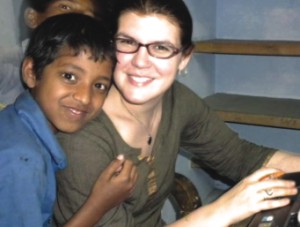|
Profile
Home away from Home
Nusrat Jahan Pritam
 Miles and miles away from home, amidst the giggles and shouts of the kids at Charfassion Orphanage, Tiffany Hodge sits, reminiscing. This is her last day here. It would be a year or two before she comes back to her second home again. Miles and miles away from home, amidst the giggles and shouts of the kids at Charfassion Orphanage, Tiffany Hodge sits, reminiscing. This is her last day here. It would be a year or two before she comes back to her second home again.
It started in 2001, when a team of 30 students and professors came from Depauw University to Charfassion, Bhola to visit the orphanage that had started its legacy back in 1972 at the hands of some philanthropic volunteers.
"It was an amazing experience to be in Bangladesh, in the orphanage. That was my first major stay away from my home in Indiana," says Tiffany. “It was the month of January, and we put up a building in the orphanage premises."
After that trip, the different people of the university drifted in different directions. However something -- a feeling, a curiosity, an ambition -- arose in Tiffany. She made a long-term commitment to the orphanage.
She came back after a couple of years, and has been involved with the orphanage ever since.
“At first, it was hard getting along. Everything was new to me -- the culture, the food, the language" says Tiffany. In 2003, I started to learn Bangla and went to Calcutta the following year just to study Bangla. It was a bit difficult at the beginning, moreover in Charfassion people spoke with a particular dialect, so I had a lot of catching up to do.”
“There is something so amazing about the orphanage. The kids are so loving. They are always happy to have visitors. The people there are really friendly and generous.”
Tiffany was pulled back to Bangladesh because of the wish to help the children at the orphanage and side by side to carry out research on Islam. Tiffany became curious about the religion from the time of her earlier visit here, and her time here was often spent attending the village salish and understanding the ways of Islam. “Most people back where I live don't know much about this religion.”
Charfassion Orphanage has an interesting history of volunteers coming from all around the world to alleviate the terrible condition of the kids there. At this moment, David, a British resides in the orphanage. It is also frequently visited by others such as Kara and Nicole and has concerned people like Cindy Gelpi in New Orleans and others. Uncannily, no Bangladeshi has ever come to the aid of the orphans here other than the patron of the orphanage, A.H.M. Mainuddin Jahangir who has inherited the orphanage from his father and around a decade ago dedicated his whole life's earnings to it. Jahangir, who recently had a stroke has only one concern -- what would happen to the kids of the orphanage when he is not there? “Even the government has refused to help, and there are continual battles against the land sharks, against poverty, etc.” Jahangir says from his hospital bed.
Tiffany thinks it is a wonder how the orphans are ever-smiling despite the constant struggle against poverty. On some occasions, she had paid the staff salary herself as a way to provide from them.
The orphanage requires a new facility design -- it has been labelled 'dilapidated', for which reason the orphans reside in the smaller wings on either side of the building or in cowsheds. Tiffany herself lives in the main building that might break down at any instant.
"I guess I miss my family back in USA. That's the only thing, which holds me back from staying here. Otherwise, the orphanage has become my second home."
Tiffany is working as a research intern at UNDP, is a FulBright Student Scholar and is working as a Program Assistant at the Centre for Torture and Trauma Survivors. She wants to become a Professor and also hopes to publish a book about her findings on Islam in rural Bangla.
Having been involved with the orphanage for almost a decade, Tiffany points to the most essential things for the institution. "Fund-raising, of course. Although the mechanism of the orphanage hardly helps it to be self-sustainable, yet income can be generated with the dairy farm project -- which already has 12 cows -- or through some agro-based project. Donation is important at the primary stage here."
“However, it is not only for the fund-raising, but people can come to the orphanage just to see the kids and it can develop itself as a tourist spot," says Tiffany. "Getting there is quite arduous and I cannot imagine how I got there so many times, but at the end of the day, it is worth it."
Copyright
(R) thedailystar.net 2010
|

